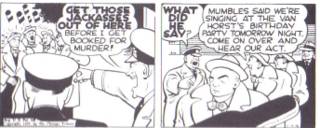
Mumbles played bass
Dinah Washington and Lionel Hampton, Blow Top Blues.
"With me, it is 'Blow Top Blues' every day," Dinah Washington.
A girl you can't excuse, who wakes up in Bellevue stinking of the whiskey she had poured on her head in the subway. Dinah Washington can make a nervous breakdown sexy and endearing. When "Blow Top Blues" became a hit in 1947 it was already a piece of the past, as Dinah had left the Lionel Hampton band the year before and was about to try her luck as a soloist.
You can winnow the classic female jazz and blues singers to a hallowed few--Bessie Smith, Billie Holiday, Ella Fitzgerald, Sarah Vaughan and Dinah--and of that few, Dinah Washington's reputation is the most neglected today. Perhaps because her early death deprived us of the ability to hear her age elegantly through music, like Vaughan and Fitzgerald, or because, genre-wise, she was hard to pin down. Was she a pop singer? A blues singer (Alberta Hunter called Dinah the true successor to Bessie Smith)? A jazz singer (she isn't mentioned once in The History of Jazz, while having recorded some of the finest jazz albums of the '50s)?
Dinah Washington was born Ruth Jones in Alabama in 1924, and by 16 she was sneaking off to play under assumed names in nightclubs while by day singing in gospel groups. She learned from the finest in gospel--Aretha Franklin's father, Rev. C. L. Franklin, and Mahalia Jackson--but the life of the soul wasn' t savory enough for a woman who would burn through nine husbands. "She'd catch the eye of some man and she'd be out the church before the minister finished off the doxology," a friend would say. (from Anthony Heilbut's The Gospel Sound.)
Soon enough, Ruth Jones had cast her fate with jazz, joining Hampton's group and changing her name. (A number of people, including Hampton, take credit for the name change. It's odd, and fitting, that Ruth Jones would change her name to something with the exact same meter as 'Billie Holiday' and 'Ella Fitzgerald'--same amount of syllables, same stresses.) Ms. Washington was on her way.
You can find "Blow Top" on this fine '47 hits compilation.
Spike Jones, The Sheik of Araby.
American pop music, which at its best is often profane and silly, has been doubly blessed with a few court jesters, none better than Spike Jones. Like a Warner Brothers cartoon come to life, or Mad Magazine's house band, Jones and his crew infested the often-dreary pop standards of the '40s, turning "My Old Flame" into a demented cry for blood by Peter Lorre, or, in this case, making a novelty song like "Sheik" even more ridiculous.
"Sheik" can be found on this greatest hits compilation--I can't think of a finer Christmas present. Happy weekend.
No comments:
Post a Comment